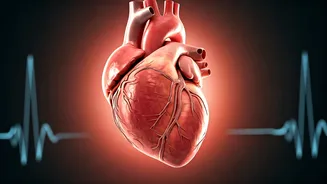Younger Adult Risks
Young adults are susceptible to diverse heart ailments. These include coronary artery disease, which arises from arterial narrowing, potentially leading
to heart attacks. Heart failure, marked by diminished blood-pumping efficiency, is another significant concern. Additionally, irregular heartbeats, or heart rhythm disorders, can trigger complications. Structural heart disease, involving heart structure abnormalities, also poses risks. It's crucial to be aware that symptoms may vary, with common warning signs of a heart attack including chest pain, breathlessness, fatigue, dizziness, and loss of consciousness. Notably, women might experience atypical symptoms like nausea, vomiting, flu-like symptoms, sweating, or discomfort in the arms, shoulders, neck, jaw, or back. Recognizing these less-obvious signs and seeking immediate medical help is vital for survival and recovery.
Family History's Impact
Family history substantially influences heart disease risk, demanding careful consideration. A family history of premature heart attacks, particularly in first-degree relatives, can elevate your risk by 60 to 75 percent. Sharing your family's medical background is thus essential for a complete risk assessment. Understanding your genetic predispositions enables proactive health strategies, including more frequent screenings and early interventions. This knowledge allows for personalized lifestyle modifications, such as dietary adjustments and exercise routines, to lessen the hereditary impact. Regular discussions with healthcare providers regarding family history are vital for creating a customized plan for heart health management.
Blood Pressure Concerns
Elevated blood pressure is frequently encountered among young adults, but often remains unnoticed. Shockingly, about one in four individuals aged between 20 to 44 may have high blood pressure without realizing it. Regular monitoring is therefore essential. Undetected high blood pressure can silently damage the heart and blood vessels over time. The condition increases the risk of heart attack, stroke, and other cardiovascular problems. Maintaining awareness of blood pressure readings and consulting with a healthcare professional can help you manage and control your blood pressure effectively. This could include lifestyle changes and medications, as necessary.
Prioritize Your Diet
Diet and nutrition are crucial elements of heart health, underscoring the necessity of a balanced nutritional approach. Poor eating habits can contribute to obesity, elevated cholesterol levels, and diabetes. Prioritizing whole foods, including fruits, vegetables, and lean proteins, is essential for supporting cardiovascular health. It's important to limit the consumption of processed foods and sugary drinks, as these can negatively impact heart health. A well-rounded diet not only helps in maintaining a healthy weight, but also provides essential nutrients that support the heart and overall well-being. Focusing on mindful eating and smart food choices can drastically improve your heart's health.
Move Your Body Daily
Regular physical activity strengthens your heart, improves blood circulation, and lowers the risk of cardiovascular diseases. Aim for at least 30 minutes of moderate exercise five days a week, or accumulate 150 minutes per week. Engaging in regular physical activity helps maintain a healthy weight and lowers blood pressure and cholesterol levels, factors that contribute to heart disease. Exercise increases the heart's efficiency in pumping blood and improves oxygen intake, thereby enhancing overall cardiovascular function. Incorporating physical activity into your daily routine, whether it's brisk walking, jogging, swimming, or other activities, is a fundamental step toward protecting your heart health.
Tobacco and Vaping
Avoiding tobacco and vaping products is critical for safeguarding heart health. Smoking and vaping adversely impact cholesterol levels and promote the formation of arterial plaque. These habits damage the arteries and elevate the risk of heart attacks and strokes. Quitting smoking or vaping can significantly lower your risk of heart disease. Consider using nicotine replacement therapies, or seeking professional help to quit. Avoiding all forms of tobacco use ensures the protection of the cardiovascular system. It is also important to be aware of the harmful effects of e-cigarettes.
Early Detection Matters
Routine check-ups are essential, especially during your 20s and 30s. A primary care physician can identify early risk factors and guide preventive measures. Early detection allows for timely interventions, helping to prevent the progression of heart disease. This may involve lifestyle modifications, medications, or other treatments. Regular health check-ups also help in early recognition of other health concerns. Early detection and proactive health management are crucial for preventing serious cardiovascular issues. It’s also important to be mindful of your overall lifestyle and take steps to reduce any associated risks.



















